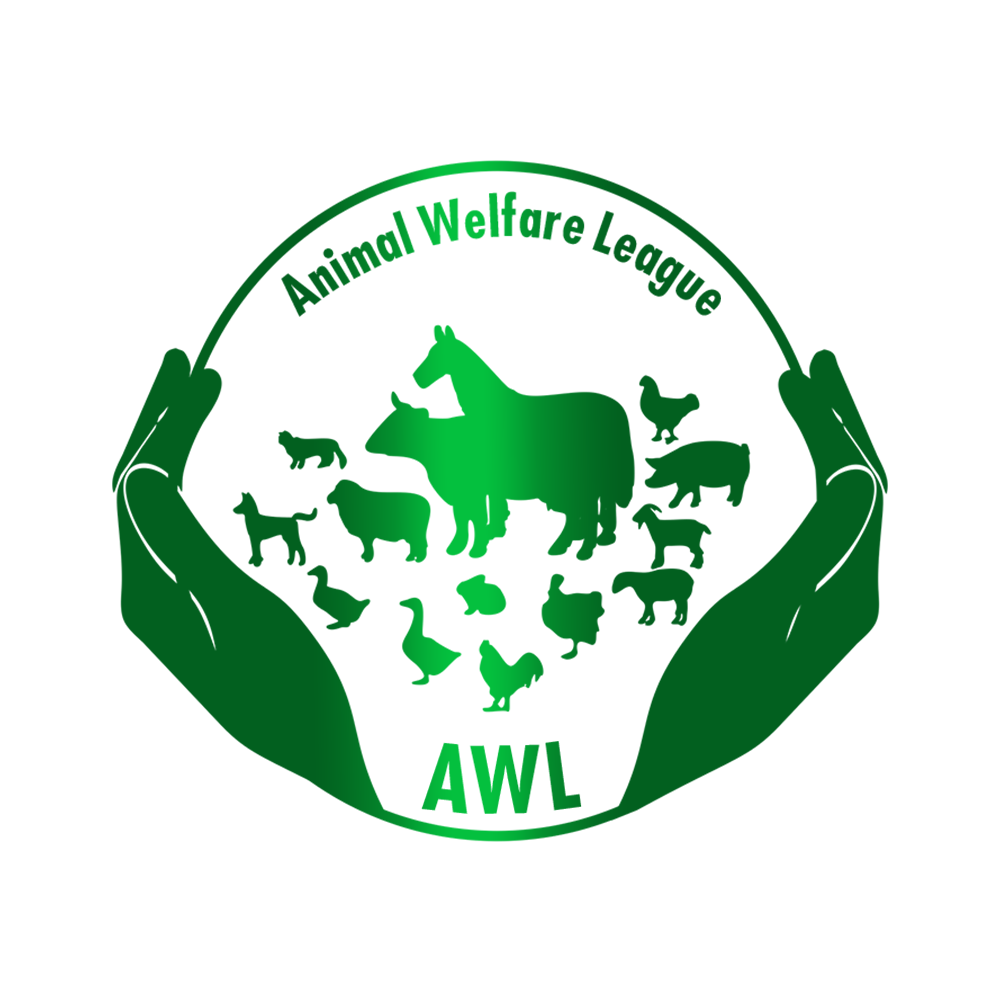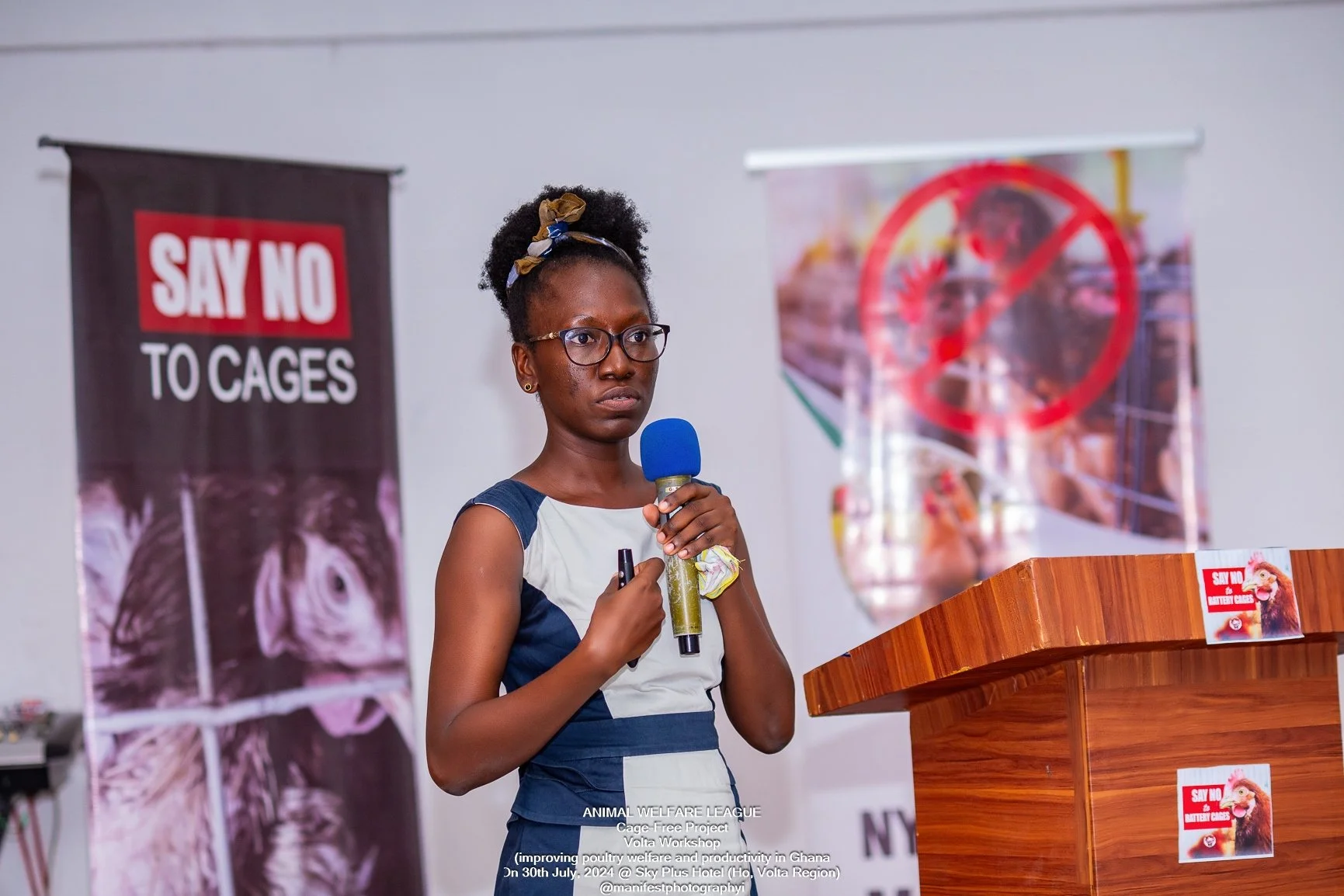VOLTA WORKSHOP RESULTS IN OVER 100,000 LAYER HENS COMMITTED TO CAGE-FREE HOUSING
A group picture of some egg-producers attendees and AWL team
Background
The Animal Welfare League, keen on sensitising egg producers about optimum animal welfare standards and the detrimental implications of the cruel caged systems, hosted its 5th edition of the Cage-Free Project Workshop. This event transpired at the Sky Plus Hotel in Ho, Volta region, on 30th July, 2024.
During this workshop, farmers from the Volta and Oti regions were educated on: cage-free systems, the five freedoms used to assess the welfare of animals, cage-free progress in Africa, battery cages and the harmful effects on layer hens, biosecurity and antimicrobial resistance, productivity in the poultry industry, and the Animal Welfare League’s farmers’ network and cage-free directory.
Volta Region is one (1) of the sixteen (16) administrative regions in Ghana, with Ho as its designated capital. It is located west of the Republic of Togo and to the east of Lake Volta.
Oti Region is one of the 6 newly created regions of Ghana carved out of the northern part of the Volta Region and it has Dambai as its regional capital. It is adjacent to the Northern Region in the north, the Volta Region in the south, and the Volta Lake in the west.
Poultry production in these regions primarily occurs on a small and medium scale with promising prospects as demand for poultry products remains increasingly high in the country.
The deep litter system happens to be the most commonly used housing system by egg producers in the regions.
Snippets From The Workshop
The workshop’s line up of guest speakers included:
Mr Lawrence A. Tetteh, the Executive Secretary of the Ghana National Association of Poultry Farmers (GNAPF), who chaired the event on behalf of Mr Victor Oppong Adjei, the GNAPF National President
Dr. Patrick Akandi-Agbodzi, the Regional Veterinary Officer in the Volta region, who, in his short address noted the health implications of various housing systems and urged egg producers to transition to cage-free systems for production.
William Dzamefe, Volta Regional Director of Agriculture at the Ministry of Food and Agriculture (MoFA), who also delivered a brief address
Aurelia Adhiambo, Open Wing Alliance (OWA) Africa Lead, who provided detailed insights on cage-free progress in Africa in her presentation
Dr Ekua Thompson, Veterinary Officer in charge of the Ho Veterinary Laboratory, who, in her presentation elaborated on farm biosecurity and antimicrobial resistance - providing exhaustive key factors that breach biosecurity, and practices (common among egg producers) that perpetuate antimicrobial resistance.
Keynote Address by the AWL's director
Dr Daniel Abiliba, director of the Animal Welfare League, in his keynote address outlined the various institutional bodies the Animal Welfare League has been liaising with over the years to elevate animal welfare in Ghana.
He touched on the various threats that have been besetting the poultry industry, highlighting the cruel caged systems and indicating the way forward -
The poultry industry has been negatively impacted by the recent outbreak of Avian Influenza and the COVID-19 pandemic. The industry is also under constant threat from the high importation of frozen poultry products from western countries. Another threat the industry faces is the ongoing pandemic of caging in the sector. The menace caused by cages is unheard of as the bearers of the pain cannot voice their frustration and discomfort. Caged systems are extremely restrictive and painful for hens, keeping them from performing natural behaviours, and subjecting them to injuries from close confinement. The solution to this pandemic is cage-free farming, which is indigenous to the Ghanaian community. We are not suggesting adopting any system from western countries. The Ghanaian ways of raising chickens like open backyard farming, free range, and deep litter, are effective cage-free methods to raise laying hens.
He said.
Welcome address by the Executive Secretary of the Ghana National Association of Poultry Farmers (GNAPF)
The GNAPF executive Secretary, Mr Lawrence Tetteh on behalf of the GNAPF national president, Mr Victor Oppong in his welcome address gave an overview of the association’s engagements with government institutions and developing partners in their quest to address concerns and finding lasting solutions to better the poultry industry.
He also added:
In realisation of the right policies to regulate the influx of frozen chicken, Urbanization, access to credit facilities as well as full operation of the entire Poultry Value Chain, an exclusion of animal welfare and disease will be detrimental to poultry operations, as such has the potential to halt activities of the poultry Industry.
Farmers were given the chance to share their general concerns and misunderstandings about cage-free and caged systems with the AWL team — notable among them were:
The issue of limited space for large scale operation under cage-free systems
Cost of transitioning from battery cages to cage-free systems
Economic difference between the cage free systems and battery cages
Egg quality difference between cage-free systems and the battery cage systems
Implications of eggs from battery cages on consumers
This was followed by clarifications tailored at addressing the issues raised by farmers
Farmers network and cage-free directory presentation by AWL's corporate campaigns lead
Cage-Free Directory
Animal Welfare League’s corporate campaigns lead, Dr Jacob Ayang, in his presentation, introduced farmers to the National Cage-free Directory - a network set up by the Animal Welfare League to enrol egg producers who have committed to the cage-free system of production; whose farm conditions and production strictly align with the minimum welfare standards of the Animal Welfare League.
Out of the 30 egg producers who attended the workshop, 24 of them (80%) consented to sign up for the Cage-Free Directory after its introduction. The reported total number of layer hens in production currently committed to cage-free housing in the Volta and Oti regions, consequently stands at a staggering 111, 475 hens. Of the 24 farmers that signed up for the Cage-Free Directory, 10 have a total number of at least 5,000 hens, and the highest producer has a total number of 20,000 hens.
Media Coverage
Both national and local media outlets were present to cover the event. They included media personnel from Metro TV, Joy News, Ghanaian Times, and Ho FM; covering the workshop to promote awareness of good animal welfare and highlight the efforts of the Animal Welfare League to improve poultry farming standards in the country – ensuring both the well-being of animals and its impact on public health, and the environment.
Next Steps
The Animal Welfare League team, led by the Community Affairs Manager, Dr Richard Dogbatse, will conduct further farm visits to provide personalised support for farmers on the network and train suitable farms for the directory.


















